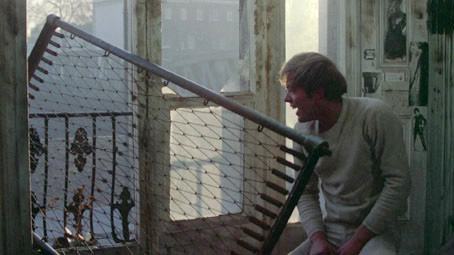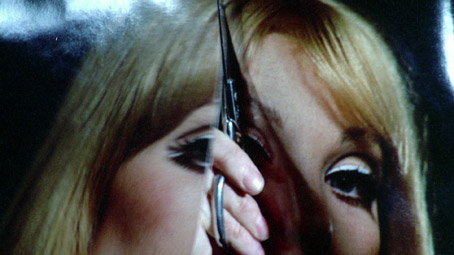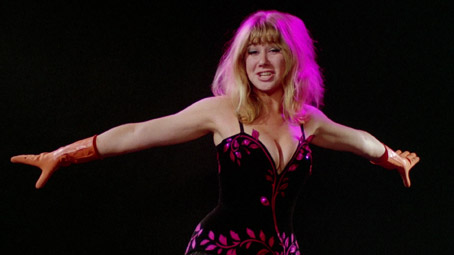|
If you by some chance find yourself in possession of a copy of Herostratus and you like the idea of experiencing a rather trippy jolt, then pop it in the player, turn out the lights and crank up the sound. Less than a minute in you'll be wondering what hit you. Two hours and twenty-two minutes later you may still be thinking the same thing.
This startling if initially indecipherable opening sequence scores big time as a surrealistic attention grabber but throws up a number of questions to which no immediate answers are supplied. Are these random images, memories, a flash forward, or perhaps even a dream? After all, nestled in amongst the imagery are shots of a woman who appears to be waking from sleep. Is she the lead character? Apparently not. When the editing settles down it's the white-dressed, running young man who's been identified for that role, as he enters the sort of run-down flat that you can't imagine anyone being in a hurry to return to. The man's name is Max and, as he glumly admits to similarly destitute neighbour Sandy in the building's hallway, he's reached the lowest rung on society's ladder.

It's clear from the early stages that symbolism is playing a key role here, as Max, in angry reaction to his landlady's complaint about the volume of his music, tears his flat to pieces, breaking up furniture and smashing windows in a whirl of furious destruction. This is not just a man wrecking his property and possessions, it's a physical manifestation of anarchic rebellion, a teardown of the symbols and trappings of everyday existence in preparation for the new direction his life is about to take.
Seemingly rejuvenated by his actions, Max heads onto the streets of London waving a felling axe and freaking out motorists (this was clearly shot guerrilla style and nearly results in one car crashing), a journey that ends in the offices of the prestigious Farson advertising agency. After toying with secretary Clio, Max wheedles his way in to see company bigwig Farson to present him with an unusual proposition – he has decided to commit suicide and he wants Farson to handle the PR for him and use it any way he sees fit. There's an acknowledged irony to this decision, as it's because of people like Farson that Max has decided to kill himself in the first place.
If you never seen or even heard of Herostratus – and what a wonderfully suggestive yet unrevealing title that is – then you're not alone, not by a long shot. Very few have, and with good reason, as although shot over an eight month period starting in 1964 and taking over two years to edit, it did not receive a public screening of any sort until May 1968, when it was the first film shown at London's then-new ICA cinema. No subsequent distribution deal followed and the film remained largely unseen by the British public and has since faded from even cineaste consciousness. And yet its influence on filmmakers of the period is clearly evident, notably in the manner in which sequences are broken up in a whirl of fast cut imagery that looks but never feels random, even at its most jarring and experimental. The same year as that first ICA screening, Donald Cammell and Nicolas Roeg began shooting Performance, a prime example of fractured narrative cinema, and one that owes a sizeable stylistic debt the film.
Herostratus is certainly a challenging experience, not least in director Don Levy's decision to experiment with an array of cinematic techniques, to incorporate footage that asks you to read meaning when there may actually be none, and to dramatically vary the pace and tone of the unfolding narrative. Fast cut sequences are followed by long scenes in which the actors appear to have been encouraged to improvise and the results allowed to play out in full. For some these sections will ramble – for me they rambled too, but in a manner that proved strangely seductive and at one point blackly comic, as when Farson and his market researcher Pointer debate with Max the details of the proposed campaign and worry that if not handled right it could all come across as a bit negative.

There's a Faustian element to Max's odyssey, as he is seduced by the simple comforts of Farson's image grooming and the tattered white of his London flat gives way to the uncluttered black of a studio bedroom whose walls are lost in a sea of impenetrable darkness. Increasingly, there is the sense that we as viewers are starting to share and experience Max's emotional instability, as the calm seas of discourse are disrupted by sudden creative storms, launching the film on a string of style-switches that suggest Levy was determined to try out every cannon in his creative arsenal, with lighting, colour, editing, music, sound effects, set design and performance all playing their part. Even still photography is employed to seriously unsettling effect, the images of blurred faces caught in frantic motion having the disturbing strangeness of a Francis Bacon portrait.
The purpose of some of the incorporated elements is not always clear – it seems unlikely that the cutaways of holocaust and post-Hiroshima documentary footage and extracts from Triumph of the Will are the crude image-association social commentary they could easily be taken for, and the inclusion of extracts from Peter Whitehead's 1965 short film Wholly Communion featuring Allen Ginsburg in full poetry-performing flow can be read as either deliberately random or an overstatement of sociopolitical intent, or even a blend of the two. And there's always a danger of (mis-) judging scenes from modern perspective, as with the sequence that cross-cuts between a colourfully lit stripper and the slaughterhouse dismemberment of a cow's carcass, a juxtaposition of beauty with horror and sex with death and the suggestion that both are effectively meat for consumption, concepts that were a lot fresher back in the mid-sixties than they may seem now.
The real surprise is that despite of the film's experimental structure and Max's air of self-importance, we actually start to care for him and his fate. Much of this is down to a captivating central performance from Michael Gothard and the gradual shift in the balance of power, as the destructive, cocksure and playful anarchist of the early scenes is transformed by big business into a ineffectual commodity whose only purpose is take his own life at the prescribed place and time. So browbeaten and humiliated is he by then that he keeps the appointment, by which point he has become a figure of pity, shuffling around an office block rooftop and huddled against the cold while unfeeling marketing man Pointer prepares his camera and barks at him to jump from the chosen side. This is one of those scenes that CG would nowadays have neutered, as actor Michael Gothard stands and even struggles with his fellow performer Antony Paul close enough to a genuinely lethal drop to catapult my stomach into my mouth and make me wonder if all involved had taken leave of their senses.

There's so much more going on here than this summary suggests, in the structure, the technique and the narrative depth, but Herostratus is one of those rare films where as a reviewer you have to either cut yourself short or dispense with the notion of delivering a review and start work on a reference book instead. It's a consistently fascinating and rather wonderful one-off that functions simultaneously on a number of levels – narrative, sociopolitical, satirical, surrealist, documentary, experimental-artistic – and whose every scene just cries out for analytical study, but which can still be enjoyed for the thrill of the experience. Yes it meanders a little in places, but does so in curiously beguiling fashion, like a charismatic storyteller who ambles to a point that you just know is going to be worth making and whose tales are punctuated with colourful and sometimes startling asides. Peppered with unexpected artistic jabs and body blows and a fair few surprises (yep, that's a young Helen Mirren using sex to sell washing-up gloves), Herostratus is a cinematic canvas on which a talented and adventurous artist has experimented with form and content around his chosen themes, and whose precise control over the structure only becomes evident in the film's final moments and can only be fully appreciated on a second viewing. Opinions will differ on whether it strikes gold on cohesion, consistency or even some of its constituent parts, but this is still a compelling, complex and intermittently electrifying one-off from an artist of genuine vision, who having broken all the rules and invented a few new ones, never made another feature.
Another fine BFI transfer, evident from an early stage in the eye-catching sharpness and detail in the street exteriors and the run-down interior of Max's flat, where picture information is retained even in dim lighting conditions. Elsewhere the image is on the soft side, probably the result of imperfections in the image as shot. Grain is more evident in lower light, but is part of the film aesthetic and not as digitally exaggerated as it seems to be in some transfers. Colours are purposefully used, and when they are bright they really stand out, with rich and subtly shaded primes. The contrast is often excellent and the black levels generally solid – there is some visible contrast flickering in places, but it's not too distracting.
The film was shot 1.33:1, but it was director Levy's intention that it be theatrically screened with the top and bottom of the picture matted to reframe the picture at 1.85:1. Thoughtfully, the BFI have provided both the 1.33:1 original and a specially prepared 1.78:1 version for side-by-side comparison – for the most part you're safe with either. The film was clearly shot with the crop in mind (in the matted area of one shot, a tape recorder whose reels supposed to be turning are conspicuously static), though watch the 1.33:1 version first and you might feel the 1.78:1 framing is a little tight on some of the close-ups, and cropping the bottom of a memorable wide shot of Max standing on the London rooftop (see below) somehow doesn't feel quite as alarming when less of the potential drop is visible. Watch the widescreen transfer first, however, and the open matte version will probably feel a little loose in its framing.
In the interview with Levy on this very disc he talks about the considerable care taken with the location sound recording and it shows here, the clarity and richness exceeding even optimistic expectations for a mono soundtrack from an independent British film from 1967. Levy's dislike of ADR means that the dialogue occasionally falls victim to location acoustics, but for the most part this is a clear, well mixed and with only minor distortion on the louder sounds.
Ten Thousand Talents (1960) (25:10)
Levy's satire on Cambridge university elitism starts in the manner of a straight-up promotional film that, like the later travelogue send-up Away From it All, gradually reveals its hand, as the plumb-voiced commentary (part of which is delivered by the young Peter Cook) is increasingly counterpointed by the imagery that accompanies it. In a sign of things to come, Levy abandons all narrative structure in the final minutes for some thrilling abstract experimentalism.
Time is (1964) (29:33)
A fascinating, impeccably researched and gorgeously edited philosophical rumination on the nature of time, constructed partly from found footage and employing just about every cinematic technique at Levy's disposal.
Five Films (1967) (7:59)
Five short experimental pieces by Levy: Punulse intoxicatingly links disassociated images through movement and demonstrates Levy's considerable skill as an editor; Malaise cross-cuts imagery to a reverberated voice-over, both of which have a semi-abstract, cut-up feel; in Catharsis a jump-cut image of a cricketer in solarised slow motion is punctuated by flash frames and rising reversed piano notes; in The Point of Noon images are rapidly cut to match the delivery of Margaret Robertson's voice-over; in Black Ice a similar voice-over is drowned out by that of the man who reads the title (there is no textual introduction and the film seems almost to flow on from the previous one) while a black screen is punctuated by semi-abstract imagery.
Don Levy Interview (1973) (33:22)
An audio interview with Levy conducted by historian Clare Spark in 1973 in which the director (reluctantly) outlines the film's narrative and talks about who Herostratus was, the changes actress Gabriella Licudi went through during the shoot, what some of those involved did subsequently, the care taken with the imagery and soundtrack, and the chronology of sequences and the editing. He also describes the film at one point as an abstract painting that uses emotions in place of oil paints, as good a summary of the film's unique qualities as I've heard.
Booklet
As ever, the accompanying booklet is a small treat and includes a detailed retrospective article on the film by Amnon Buchlinder, a piece of similar length on Don Levy and the Slade School by Henry K. Miller, some very positive press clips from what looks like the original programme, biographies of Don Levy and Michel Gothard, credits for the main feature and credits and brief summaries for the shorts, information on the presentation and the transfer, and some high quality stills.
If your taste in film runs to the adventurous then I seriously urge you to hunt Herostratus out. Of the six films released so far in the BFI's Flipside strand this has proved the most revelatory, and the one most worthy of rediscovery and study. Once again the transfer has the film proud, and the extras are all fascinating and highly relevant to the feature. Highly recommended.
|